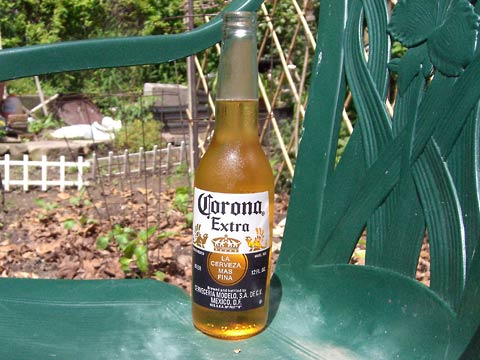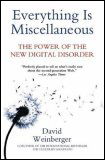My little piece of Paradise
 It's a sign of something (I'd rather not discuss what) that today my garden with its pepper, eggplant and tomato seedlings seemed a pretty acceptable version of Paradise.
It's a sign of something (I'd rather not discuss what) that today my garden with its pepper, eggplant and tomato seedlings seemed a pretty acceptable version of Paradise.
Tonight I spent a half hour rummaging through boxes and albums with thousands of photos I've taken over the years trying to find a photo I took of a bottle of Corona on a table overlooking a turquoise sea in the Bahamas. That was Paradise in 1995.
OK, it would still be Paradise now, but point is I'm willing to settle for less.
[Found the photo the next day, sort of]
 Searching for—and not finding—the photo from 1995 brought home the point behind the book I've been reading, Everything Is Miscellaneous: The Power of the New Digital Disorder
Searching for—and not finding—the photo from 1995 brought home the point behind the book I've been reading, Everything Is Miscellaneous: The Power of the New Digital Disorder, by David Weinberger. The author points out that a central problem with organizing "atoms"—stuff—is that they can be in only one place at a time.
Take my Corona-by-the-sea photo. I didn't find it in the storage box that held "Bahamas 1995 Roll 1," "Bahamas 1995 Roll 2," "Bahamas 1995 Roll 3," and "Bahamas 1995 Roll 4."
It wasn't in the "Bahamas" album I found in a drawer in the middle room—those photos were from a different trip.
It wasn't in any of the other albums I discovered in the corner of Joanne's office.
It could have been in any of those places, but I'm pretty sure it's in yet another Bahamas photo album that I haven't unearthed yet.
So, since atoms can only be in one place and I haven't yet found the right place, I'm screwed. But in the realm of "bits"—digital information—it doesn't really matter where the specific bits are. They can be anywhere because they don't take up space. The problem of finding them is made much easier by labeling them with as many descriptive words as possible. Adding more digital information doesn't take up more space as it would if we were using index cards. What would make things more cumbersome in the physical world has the opposite effect in the digital world. More (information) is better.
So in this case I might have tagged the photo Bahamas, beer, Corona, 1995, vacation, beach, Al & Joanne, vacation, etc. When I wanted to find it I'd have used a search engine and typed what seemed most important: Bahamas and Corona, probably. And boom, I'd have had it.
Back to the book for a minute: don't be put off by the "seriousness" of the topic. Weinberger has a knack for explaining the problems and solutions in terms that are easy to understand. If you've ever tried to figure out how to organize your silverware drawer or sort the clothes in your closet you'll be able to follow his thinking quite well.
He also tackles the big issues, pointing out how old style classification systems— Dewey Decimal, for example—are not only limited and limiting, but inevitably enforce the cultural biases of their creators. Dewey, a Christian, assigned eight of the nine major categories under Religion to Christian books, while relegating Buddhism to a mere subcategory. Islam fares only slightly better.
The book doesn't set out to discredit Dewey or anyone else. It simply and clearly points out how old methods of organizing knowledge are restricted by having to work with atoms in the form of books, card catalogs, shelves, boxes, etc. The digital world offers a whole different way of organizing because space is no longer a limiting factor.
Good book. Helps you understand one of the bigger issues of our time—how we deal with an ever-increasing deluge of information—and makes it easy. Not quite as clear, perhaps, as This Means This, This Means That, my favorite book on semiotics, but still enjoyable. Strange as this may sound, I'd even take it along on vacation. It's a geeky type of beach reading.
This video covers some of the same territory as the book. It's worth a look:
Top |
|
![]()